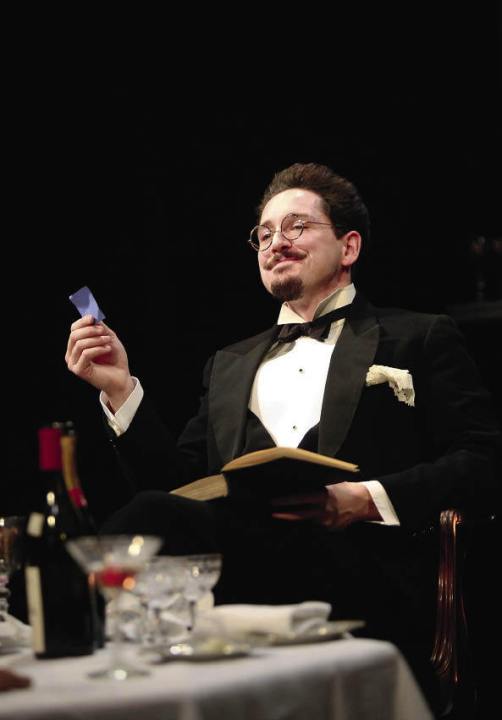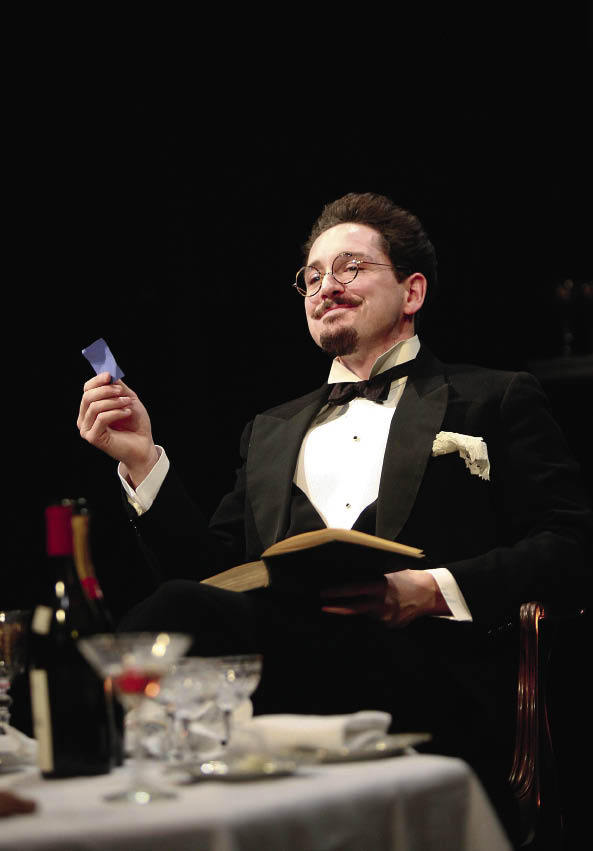Rope
Almeida
Generous
Finborough
Oh dear, not this again. I’ve seen Hitchcock’s wonderfully creepy film Rope several times and I had little appetite for the Patrick Hamilton play on which it’s based. Big surprise. The film script was radically customised to accommodate the timid tastes of 1940s film-goers. The original, from 1929, is more daring, subtle, profound and psychologically interesting in every way. In fact, this isn’t just a masterpiece. This is one of those rare occasions in art when a mind of extraordinary power takes a stale genre — the repertory thriller in this case — tosses aside all the conventions and raises the format to a previously unimaginable plane of sophistication.
Right from the first line Hamilton rewrites the rule book. He starts by solving the mystery. A pair of amoral toffs kill a friend in order to test Nietzsche’s dictum, ‘live dangerously’. The suspense of the play comes, quite unexpectedly, from our sense of complicity in the crime and from our fear, thrillingly tinged with hope, that the murderers may escape detection. In Hamilton’s hands, the whodunnit becomes a wide-ranging inspection of human behaviour, encompassing caustic social satire, hilarious theological jesting and an analytical clash of philosophies.
The biggest change Hitchcock forced on Hamilton’s script is in the character of Rupert, the murderers’ nemesis. James Stewart played him as a suave middle-aged academic but the character Hamilton wrote was a crippled and lisping young aesthete. His purpose — surprise. Of all the characters, Rupert is the least likely homicide detective. Bertie Carvel plays him absolutely exquisitely, giving him a glorious and unsettling strangeness and drawing every last drop of comedy and pathos from the role. He walks with a limp. He has a goatee beard and a fiddly moustache. His Frenchified voice drips with fragrant self-regard. And his coiffure deserves to win a silly-hairdo prize. The black curls are crimped and stiffened into a pointy oval so that he looks like a man wearing a vase made of bearskin. Yet these weird and distracting details harmonise perfectly with the character and illuminate a thoroughly convincing archetype — the vain and eccentric genius. Rupert gets easy laughs poking fun at the half-witted flapper Leila (played with gauche grace by the excellent Phoebe Waller-Bridge). He teases us with an assessment of his latest work. ‘Not only will it be the best thing I’ve ever written, it will be the best thing I’ve ever read.’ And his mockery of Christianity reaches sublime heights. He dissects the Ten Commandments and dismisses them all, except the injunction to honour one’s parents. ‘Of course, I do that. Every year, on my birthday, I send them a telegram of congratulation.’
But he’s more than just a smug drawing-room wit. He’s also an army veteran, gravely injured in the first world war. This is dramatically vital. A catchpenny balladeer would lack the guts to square up to two callow murderers. The job requires a man who has looked death in the face, and Rupert’s transformation from snooty bookworm to angel of vengeance is one of the most electrifying moments I can recall seeing in a theatre. His final speech, denouncing the creed of aristocratic violence, has a simple muscularity that places it alongside the finest pieces of dramatic oratory ever written. There are more great performances in Roger Michell’s production than I have space here to praise but let me say this: if the Arctic should revisit us this winter, brave the blizzards to see this show, and in particular this performance. Right now Bertie Carvel is my favourite actor in the world.
Generous, at the Finborough, is Britain’s first exposure to Michael Healey, who toils beneath the label ‘Canada’s leading dramatist’. Like Tibet’s top pole-vaulter and Albania’s crochet champion, this isn’t a category to make the heart beat very much faster but Healey’s script has some virtues. An overcomplex structure isn’t one of them. Three interconnected playlets examine the themes of casual violence, topsy-turvy sexual relations and the conflict between ambition and responsibility. Not all the cast, let’s face it, are from the uppermost rung of the profession (and some are barely on the ladder at all), but Jane Perry is a formidable talent and her performance as a ruthless corporate nymphomaniac is the show’s highlight. ‘I can deal with the public, it’s people I have trouble with.’ There’s a complexity and a truth to this sizzling boardroom Boadicea that’s highly compelling, and Perry offers a brilliant essay in aggressive eroticism. Michael Healey has a lot to offer. It’s a pity this fragmented album of dramatic ideas was chosen for his London première. Later this year he returns to the same venue with a new play. I’ll be there, too, provided it doesn’t clash with the UK debut of Tahiti’s leading bungee-jumper, Namibia’s top cribbage expert or Israel’s greatest matador.








Comments